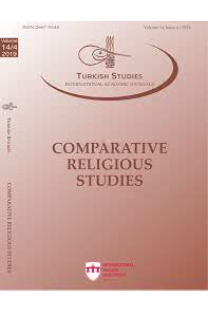Kur’an Ayetleri Bağlamında Mehmet Akif’in Marifet ve Fazilet Temelli Terakki İdeali
Mehmet Akif Ersoy, Osmanlı’nın son dönemlerinde yaşamış, düşünce tarihimize tesir eden önemli bir mütefekkirdir. Onun içinde yaşadığı coğrafya ve mensubu bulunduğu toplum, son birkaç asırdır sancılı bir süreçten geçmektedir. Akif’in hassas ve içli yapısı, döneminin sorunlarıyla yakından ilgilenmesini ve problemlere çözüm bulmak için çalışmasını sağlamıştır. Onun bu çabası esnasında temel dayanağı Kur’an’dır. Klasik anlamda bir müfessir olmasa da Kur’an’a hâkimiyeti, Kur’an’ı merkeze alan söylemi kendi çağdaşları arasında müstesna bir yer işgal etmesine vesile olmaktadır. Akif, çağdaşı olan birçok düşünürden bu bakımdan ayrılmaktadır. Toplumsal hayatta tespit ettiği sorunlar ve bu sorunlara dair çözümleri önem kazanmaktadır. Müslüman toplumların din adına ortaya koydukları yanlış uygulamalar, dünya hayatının gerektirdiği çalışma ve azimden uzak halleri, ahlaki konularda yaşanan yozlaşmalar Akif’in tespit ettiği temel problemlerdir. Bu problemlerin halledilmesi ile toplumsal terakkinin mümkün olacağı kanaatindedir. Ona göre Müslüman toplumların asırlardır sahip oldukları yüksek mevkiye yeniden ulaşabilmeleri için hem ilim, fen ve sanat alanında hem de ahlaki erdemleri kazanma noktasında düzenlemelerin yapılması gerekmektedir. Bu çalışma Mehmet Akif’in gerek şiir gerekse düz yazılarından istifade ederek toplumsal terakkiyi gerçekleştirmek üzere tespit ettiği iki önemli alanı, marifet ve fazilet konularındaki sorunları, ortaya koymaktadır. Akif’in Kur’an’dan ilhamla gösterdiği çözüm yollarını beyan ederek düşünürün günümüze de yol gösterecek terakki ideali beyan edilmeye çalışılacaktır.
The Progress Ideal of Mehmet Akif Based on Ingenuity and Virtuein the Context of the Verses of the Qur’an
Mehmet Akif Ersoy is an important thinker living in the last period of the Ottoman Empire and influenced our history of thought. The geography he lived in and the society he belonged to had been going through a painful process for the last few centuries. His sensitive and intimate nature enabled him to closely deal with the problems of his time and to work to find solutions to problems. During his effort, the main basis was the Qur’an. Although he is not an interpreter in the classical sense, his domination of the Qur’an and his discourse that puts the Qur’an in the center causes him to occupy an exceptional place among his contemporaries. Akif differs from many contemporary thinkers in this respect. The problems it detects in social life and the solutions for these problems gain importance. The main problems identified by Akif are the wrong practices of Muslim societies in the name of religion, their state of being far from the work and determination required by the worldly life, and the corruption in moral issues. He was of the opinion that social progress will be possible by solving these problems. According to him, in order for Muslim societies to reach the high position they had held for centuries, arrangements should be made both in the field of science and art and at the point of gaining moral virtues. This study reveals the two important areas that Mehmet Akif identified in order to realize social progress by benefiting from his poems and proses, the problems of ingenuity and merit. By stating the solutions that Akif showed with inspiration from the Qur’an, it will be attempted to declare the progress ideal of the thinker that will guide the present day.
___
- Akpınar, A. (2011). Vahyin aydınlığında yaşayan adam Mehmet Âkif. Diyanet İlmî Dergi, 47(4), 7-20.
- Çantay, H. B. (1966). Âkifname (Mehmed Âkif). Ahmed Sait Matbaası.
- Devellioğlu, F. (2006). Osmanlıca-Türkçe ansiklopedik lûgat. Aydın Kitabevi
- Düzdağ, M. E. (2009). Mehmed Âkif -Mısır hayatı ve Kur’ân meâli-. Şûle Yayınları.
- el-Cevherî. (1984). es-Sıhâh tâcu’l-luğa ve sıhahu’l-Arabiyye. Dâru’l-İlm li’l-Melâyîn.
- el-Cürcânî. (1984). Kitâbu’t-ta’rîfât. Dâru’l-Ma’rife.
- el-Ezherî. (t.y.). Tehzîbu’l-luğa. el-Müessesetü’l-Mısriyye.
- el-Fîrûzâbâdî. (2005). el-Kâmûsu’l-muhît. Müessesetü’r-Risâle.
- Ersoy, M.A. (1990). Safahat. Sentez Neşriyat.
- Ersoy, M. A. (1944). Kur’an’dan âyetler ve nesirler. Yüksek Yayınevi.
- İbn Manzûr. (t.y.). Lisânü’Arab. Dâru’l-Meârif.
- İmamoğlu, A. (2010). M. Akif’in dindarlık anlayışı. İçinde Mehmet Akif -edebiyat ve düşünce- (222-237). TYB Vakfı Mehmet Akif Ersoy Araştırmaları Merkezi Yayınları.
- Mehmed Âkif. (1330). Tefsîr-i şerîf. Sebîlürreşâd, 8(195), 233-234.
- Mehmed Âkif. (1330). Tefsîr-i şerîf. Sebîlürreşâd, 8(201), 353-354.
- Mehmed Âkif. (1330). Edebiyât: Süleymâniye kürsüsünde. Sebîlürreşâd, 8(206), 459-460.
- Mehmed Âkif. (1330). Tefsîr-i şerîf. Sebîlürreşâd, 9(211), 41-42.
- Mehmed Âkif. (1330). Tefsîr-i şerîf. Sebîlürreşâd, 9(214), 101-102.
- Mehmed Âkif. (1330). Tefsîr-i şerîf. Sebîlürreşâd, 9(220), 213-214.
- Mehmed Âkif. (1331). Tefsîr-i şerîf. Sebîlürreşâd, 9(223), 261-263.
- Mehmed Âkif. (1331). Hutbe ve mevâiz: mev’iza. Sebîlürreşâd, 9(230), 373-376.
- Mehmed Âkif. (1331). Hutbe ve mevâiz: ikinci mev’iza. Sebîlürreşâd, 9(231), 386-391.
- Mehmed Âkif. (1331). Hutbe ve mevâiz: üçüncü mev’iza. Sebîlürreşâd, 9(232), 405-408.
- Mehmed Âkif. (1338). Mev’iza. Sebîlürreşâd, 18(458), 183-186.
- Mehmed Âkif. (1339). Nasrullah kürsüsünde. Sebîlürreşâd, 18(464), 249-258.
- Mehmed Âkif. (1339). Tam müslüman olmadıkça felâh yoktur. Sebîlürreşâd, 18(466), 278-282.
- Mithat Cemal. (1986). Mehmet Akif. Türkiye İş Bankası Kültür Yayınları.
- Topçu N. (1970). Mehmet Âkif. Hareket Yayınları.
- ISSN: 2667-5544
- Yayın Aralığı: Yılda 4 Sayı
- Başlangıç: 2006
- Yayıncı: ASOS Eğitim Bilişim Danışmanlık Otomasyon Yayıncılık Reklam Sanayi ve Ticaret LTD ŞTİ
Sayıdaki Diğer Makaleler
ʿAlî eş-Şeyhânî ile Yûnus el-Erkatinî’nin Terkîb Adlı Eserlerinin Mukayesesi
Ortaokul Öğrencilerinin Değerler Eğitiminde Bir Faktör Olarak Sosyal Aktivite
Va’d, Va’id Âyetlerindeki Ma'rife ve Nekranın Dilbilimsel Analizi
Günümüz Dünyasında Din Felsefesinin Yeri ve Önemi
Sivil Din Tartışmaları ve İslamcılık
Anadolu Tasavvuf Hareketlerinin Kökenleri ve Eklektik Karakteri
Tefsirde İsrâiliyat Tartışmaları: Mukâtil b. Süleyman ile Muhammed Âbid el-Câbirî Örneği
Kur’an Ayetleri Bağlamında Mehmet Akif’in Marifet ve Fazilet Temelli Terakki İdeali
